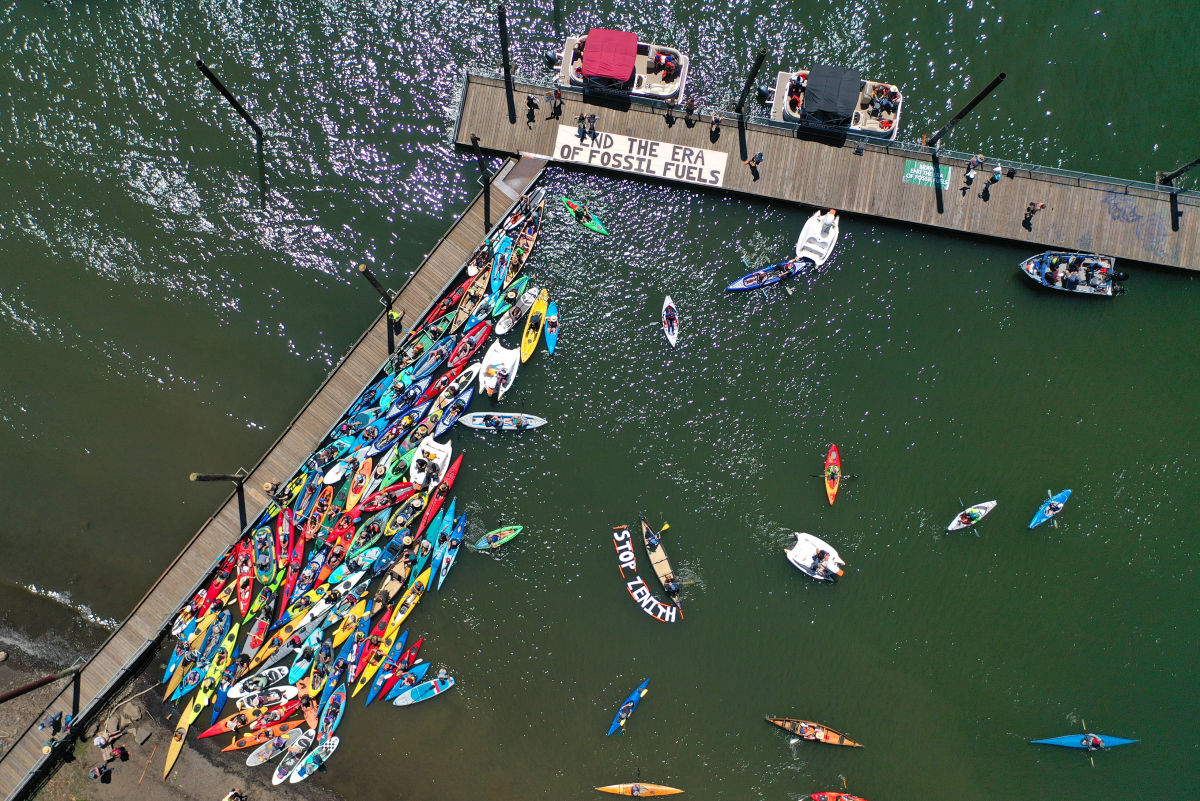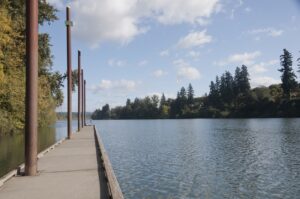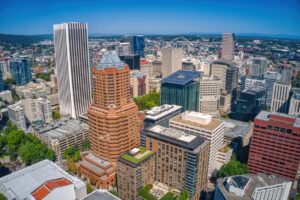Mosquito Fleet Wants to Shift How Portlanders Relate to the Willamette

In June 2022, hundreds of kayaktivists took to the Willamette to oppose Zenith Energy, the Houston-based oil company that operates a fuel terminal in Northwest Portland.
Last summer, on one of those long and perfect June evenings, I joined a sunset paddle with a group called Mosquito Fleet. About 20 of us launched kayaks, provided to us for free, into the Willamette River just north of the St. Johns Bridge. For many in the group, it was their first time in a kayak or on the Willamette. As we paddled, Kelsey Baker and El Navarro, two members of Mosquito Fleet’s leadership team, pointed out osprey nests on the BNSF Railway Bridge and evidence of beaver dens on the banks. A raft of ducklings skittered past, and Baker and Navarro turned our attention across the river, to Zenith Energy’s line of enormous fuel tanks. At Willamette Cove we paused, discussing potential cleanup plans for what is one of the most polluted spots within the 10-mile Portland Harbor Superfund Site.
“Not a lot of people think of kayaking as political,” Baker says. “But when you’re paddling in the middle of a Superfund site across from a six-mile stretch of tanks full of explosive fossil fuels, you can’t ignore it.”

Mosquito Fleet launches from Green Anchors, a former industrial site just north of the St. Johns Bridge.
Mosquito Fleet has always been political. Its origins are in so-called kayaktivism—using flotillas of kayaks for on-water demonstrations, especially to fight for climate justice. In 2015, the Fleet helped organize hundreds of kayakers in the Port of Seattle to oppose Shell Oil’s plans for Arctic drilling. A few months later, Portland briefly became national news when, as part of the ongoing #ShellNo protest, 13 climbers dangled from the St. Johns Bridge, blocking the passage of the massive Fennica icebreaker. In the river below, dozens paddled in kayaks
and canoes.
Over the past two years, as the Fleet has reemerged following a pandemic-induced dormancy, the mission has become more elemental: providing access to waterways. Access, in turn, builds connection. Beyond social outings—sunset paddles, BIPOC paddles, queer paddles—the Fleet runs a lending library with about 25 kayaks, plus a few canoes. Library members can check out boats, for free, during daylight hours from early summer to early fall. (This year, it opens June 29.) Baker says it was one of her first ideas after she took the Fleet baton in 2023, and in the process got the keys to a shipping container filled with kayaks and all the associated gear. That container, now joined by a second, sits at Green Anchors, a sort of eco-art compound on a former industrial site on the Willamette. Imagine a business park by way of Burning Man, nestled next to North Portland’s Cathedral Park.

“I was just like, How can we share this?” Baker recalls. “Like, this is awesome—we have so many resources, and we’re right here on the water. I don’t want to just be a small group of people who paddles together and does actions every once in a while. There’s so much space in between that.”
The Fleet now works both on water and on land, running its own events while also teaming and scheming with other local organizations. Last summer brought kayak trainings and river and beach cleanups as well as disaster preparedness workshops, and late last year the group started using canoes to distribute food and water to unhoused folks living along the Willamette. Paddling continues as a form of protest: In the last two years, flotillas have raised banners to oppose PGE’s proposed clearcut in Forest Park and to call on the City of Portland to rescind its land use permit for Zenith Energy. But the expanded scope is a reflection, Baker says, of how 2025 looks different than 2015. “What does it mean to do climate justice work in a time of climate chaos?” she asks, pointing to the kayakers in western North Carolina who delivered supplies and conducted search and rescue during and after Hurricane Helene.

Mosquito Fleet’s 10-member leadership team includes El Navarro and Kelsey Baker.
Another of Baker’s early moves was to grow the leadership team; it now counts 10 members, all of whom are BIPOC, queer, and/or femme. They’re geographically dispersed, and Baker herself moved to Seattle last fall to extend Fleet work there. Baker’s first hire was El Navarro, a Portlander who grew up in Corvallis and spent summers swimming and kayaking in the stretch of the Willamette that flows through that city. For Navarro, a key piece of the work is reframing notions of the Willamette as dirty or gross or unsafe. “To a certain extent, those things are true,” they say. “But it itself is not this poisonous, nasty thing. It had poisonous, nasty things done to it. Once we start seeing it as a living thing that doesn’t deserve to have that done to it, then our minds start shifting about what’s actually possible for the future of the river.”
It was that room for possibility—that sense of imagination—that struck me on the sunset paddle last June. After an hour and a half on the river, we grouped up, and Navarro invited us to reflect on the evening. “Over the summer, I started building more space in the social paddles for sharing gratitude, sharing connection,” Navarro later told me. “I started asking folks to think about their ancestral connection to water, no matter who they are.” Getting to witness people’s responses has been their favorite part of Fleet work.
“You have to provide folks the opportunity to get on the water and see what’s going on,” Navarro says. “To actually care and invest in it—for those direct actions to be worth it, for it to mean something—you have to show them what’s at stake.”
Share this content:















Post Comment